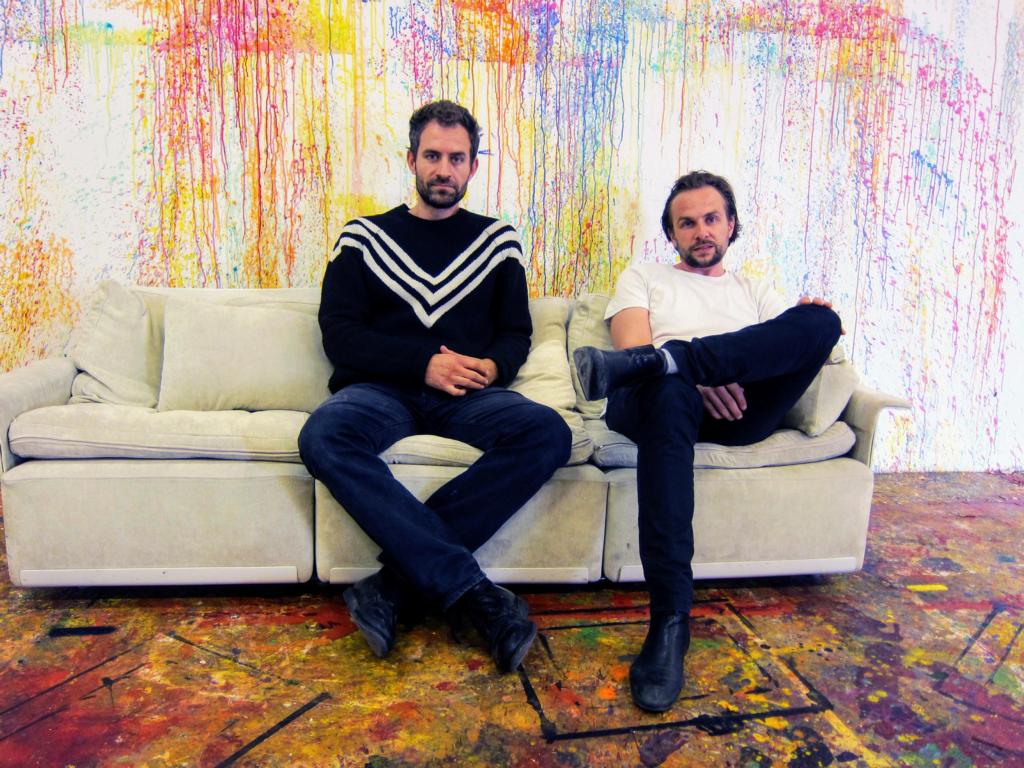 Danish label Tambourhinoceros has accompanied us on these pages for quite a while now. As a mag specialised in progressive music styles we weren’t able to include a high percentage of their many thrilling releases (but wait – Prog-Weirdoes like Birthgiving Toad merely escaped our attention – our bad)… But the ones we did review, we found always to be special and mostly just excellent. Reason enough for a chat with Kristoffer Rom (right in the picture) and Tue Kjerstein…
Danish label Tambourhinoceros has accompanied us on these pages for quite a while now. As a mag specialised in progressive music styles we weren’t able to include a high percentage of their many thrilling releases (but wait – Prog-Weirdoes like Birthgiving Toad merely escaped our attention – our bad)… But the ones we did review, we found always to be special and mostly just excellent. Reason enough for a chat with Kristoffer Rom (right in the picture) and Tue Kjerstein…
All english interviews on BetreutesProggen.de
I’ve always liked imagining that mutant being, half-instrument, half-animal embodied in the name
Congrats, this year is your tenth Anniversary! How did it all start? And why? What does your name stand for?
Thanks so much! Well, we grew out of the band Oh No Ono where me (Kristoffer) and Aske, the guitar player, wanted to create a platform for our friends that didn’t have a label home. We felt out taste in music, holistic approach and ambitious nature in combination had something to offer compared to other local labels.
And he** yeah the name is a weird one :-). It was actually the bass player / singer of Treefight For Sunlight who came up with it. Neither Treefight For Sunlight nor Tambourhinoceros had a name before we started preparing their debut release. I’ve always liked imagining that mutant being, half-instrument, half-animal embodied in the name – and also the fact that it’s this tiny delicate instrument and a huge beast of an animal. It’s almost like artists in the music industry, Hahaha.
-
- Founding year: 2010
- Headquarters: Copenhagen
- Homepage
- Number of employees (full-time / volunteer): 3 / 2
- Managing directors: Kristoffer Rom, Tue Kjerstein
- Revenue: not specified
There are so very different artists on your label…
How would YOU describe the profile of your label? Is there a “common denominator”? (your homepage gives none – it just features your artist and doesn’t waste a single word on the label and the people behind it).
We want to be a vehicle for adventurous and ambitious artists and wear our genre-agnostic approach as a badge of honour! That said, I do feel there’s some common denominators. Our artists share an adventurous approach to making music. While some may sound pretty straight forward there’s usually some complexities or playfulness going on production-wise, musically and/or lyrically that makes the music unique.
Is there any music that defines the label, so that everyone thinks “could only appear on XY!” (Or “that should have appeared on XY”)?
I don’t think there is really;).
If there was – what could be the tie between e.g. the romantic noise of The Entrepreneurs, the Nick Drake ism of The New Spring, the self-forgotten singsong of August Rosenbaum and the utter 15/15 madness of Pardans?
Nice picks! Well, August and Pardans obviously both have (some of their) roots in jazz. The noise-side of Pardans bridges the gap over to The Entrepreneurs who also has a quieter side to them – take for example the song ‘Morning Son’ – that very related to the folky singersongwriter-music of The New Spring.
Sie sehen gerade einen Platzhalterinhalt von Standard. Um auf den eigentlichen Inhalt zuzugreifen, klicken Sie auf den Button unten. Bitte beachten Sie, dass dabei Daten an Drittanbieter weitergegeben werden.
Who is/are your best-seller/s? Efterklang may be the best known name in your roster?
They probably are, yeah. But we released an opera with them which had its commercial limitations. Palace Winter is probably our best selling act to date, they do really well in the UK and also alright in Denmark. And then there’s tracks here and there that takes of, most recently Molina’s single ‘Hey Kids’ has really struck a chord with people all over the world.
Sie sehen gerade einen Platzhalterinhalt von YouTube. Um auf den eigentlichen Inhalt zuzugreifen, klicken Sie auf die Schaltfläche unten. Bitte beachten Sie, dass dabei Daten an Drittanbieter weitergegeben werden.
How does the selection of the artists take place – do you randomly pick who gets accepted from the long line of supplicants? Are these individual or team decisions?
We’re super picky and spend ages making up our minds – to much annoyance for the artists and managers we’re talking to. We rarely sign anything from an unsolicited demo (though it’s happened a couple of times). We spend a lot of time on checking out new artists, and we get a lot of recommendation from our friends in the industry or our existing roster. When we finally start a conversation with somebody we make sure that everyone has the same vision for the future, that there’s a team on board to handle management and live etc. And sometimes those conversations results in signings – and other times they don’t :-).
To what extent is “market research” conducted in terms of popularity and commercial potential? To what extent or at what point is it mostly or even exclusively about creative potential?
We insist on both aspects. The music comes first – but it can’t be the only criteria. We like to invest in our artists both financially and in terms of man hours and we need artists that are willing to put in a lot of work on both the creative and commercial side to make that business model work.
Are you musician/s yourself?
Yup, but I don’t have time to be out playing actively anymore. As mentioned I played (drums) in the band Oh No Ono for a decade. I’ve also done a few session records and even toured a year with Aqua at some point:).
Most of our team are still playing semi-professionally while working on the label actually.
What are you listening to right now?
Here’s a few whose new music I’m into at the moment: Skullcrusher, Kelly Lee Owens, Melkbelly, Yves Tumour (Sean Bowie), Porridge Radio and Agnes Obel.
Business Case and Marketing
How did your business develop and move in recent years?
Most significantly we launched a publishing division a year or so ago allowing us to work with both the recordings and the musical works. There’s a lot of synergy by doing that under one roof. Other than that our business development is all about getting better at what we do and making sure to work with like-minded artists.
The CD disappears (allegedly), vinyl is coming back, downloads and streaming destroy functioning business models that worked for decades – what can we expect next? (Except for the tape cassette contemporarily experiencing some small revival already)?
The music industry’s business models fundamentally haven’t changed all that much over the years in my opinion. But the market is so oversaturated that every tiny detail matters. You can’t just curate and distribute music as a label anymore, you need to constantly improve every single thing you do to survive.
Artwork has always been at the heart of our company
What strategies do you have for persuading people to buy your physical products nonetheless?
Plus – how important are artworks today? How do your products typically come to their artwork?
We have a global network of physical distributors in place and our own webshop and Bandcamp – but it goes for all of us that we can only sell as many records as the demand warrants. So that’s where we put our energy, in creating a demand. That can be done via creating great products, promotion, marketing, touring etc.
Artwork has always been at the heart of our company. We have an inhouse art director that’s probably designed half of our releases. And when artists work with an outside partner we’re always a part of that process. Whether it’s audio, video, photography or artwork we approach it in a holistic way where they’re all reflections of the artist’s universe.
Is there a subscription model for purchasing (any) of your products or other loyalty programs? If so, what is the acceptance like?
We haven’t rolled such out yet. Maybe we should.
What role do print media play today – and what is the response to a) reviews, b) interviews, c) ads (if you place any)?
Promotional coverage in both print and online media rarely converts to sales or streams in itself anymore. But having broad coverage can help the agent secure the right shows, or help us in getting airplay or similar. It’s all connected and it feels like you increasingly need to perform on all fronts to become a success.
The type of content doesn’t matter that much, it’s the quality of it. A well-written article can help us tell the story of an artist no matter if it’s a review, an interview something else.
How do you track this response?
We occasionally run print ads but generally rely more on digital for advertising as that can convert much easier and be measured more precisely. You can of course measure some print ads through QR-codes or similar but we mainly do them to show support to a magazine we like.
With how many print media in Denmark and internationally do you cooperate regularly, meaning: you provide them with new releases, news, tour dates?
A few hundred I guess. And on top of those we bring in PR companies in the most important markets for a specific release.
What about the online media when it comes to the response to a) reviews, b) interviews, c) commercials?
With how many online media at Denmark and internationally do you cooperate regularly meaning: you provide them with new releases, news, tour dates?
The online landscape is huge – we have close to a thousand direct relationships and we discover new sites every week.
What relevance do social media have for marketing and keeping in touch with product buyers?
It’s super important to us. As important as music media.
Which channels do you use, which are most important or most successful?
We’re on most of the mainstream platforms (IG, Facebook, Twitter, YouTube etc.). They have their individual strengths and weaknesses.
Can you still cope with doing that yourself or do you receive any help from service providers?
We do that ourselves in collaboration with our artists and their managers.
What are your experiences with promotion / press agencies?
Some are great and bring a lot of value to a campaign. We don’t measure their worth only on results but also from general level of communication, reputation etc. There’s never any guarantees and sometimes a fantastic agency aren’t able to provide results because of other aspects out of their control. We know that as we also have an agency within our own company (nordicwaves.net).
And then there’s a few rotten apples in the industry that needs to be avoided…
Conversions / Splits
According to your contracts (or those of Spotify, Bandcamp, YouTube, Apple, Google, Amazon & Co.), how much of your sales proceeds goes to
a) the artist
b) the label
c) the distribution or the platform
for sales of
– CD
– Vinyl
– Download
– Streaming?
We do simple deal structures of 50/50 splits, no matter what format is being sold.
If you offer “Name Your Price” / “Pay What You Want” on Downloads: What is paid on average?
We haven’t done that enough to be able to say anything about tendencies on this area.
Thank you very much for your enlightening answers!
 Surftipps for Tambourhinoceros:
Surftipps for Tambourhinoceros:
Homepage
Bandcamp
Facebook
Twitter
YouTube
Instagram
Spotify
LinkedIn
Wikipedia (engl.)
But let’s continue with another label! The initial idea was as follows: our favourite book publishers have such an individual, striking profile that one can buy and read their products, so to speak, “blindly” (i.e. without even knowing the respective author) – without ever being disappointed. Doesn’t this prove true with some music labels too?
All illustrations: Tambourhinoceros, by kind permission





